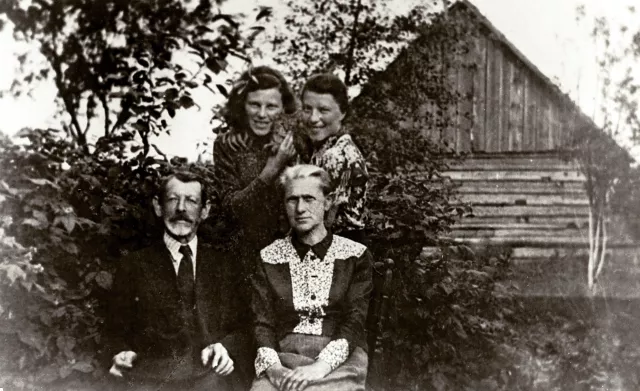Salomea Gemrot with her parents and sister
This is a picture of me with my family taken probably in September or October 1939 in Staroniwa near Rzeszow where we lived. We sent that picture to Russia where my brothers Zygmunt, Mojzesz and Salomon left to right after the war broke out. My mother was already very worn out in that photograph, exhausted with all the experiences we were going through then. My sister Malinka is holding our cat. The wooden building you can see in the back is our neighbour's barn. I think I got that picture after the war from Zygmunt or Salek.
My brothers left for Russia while it was still possible. When the borders were not closed yet and the Germans had already reached Staroniwa. Father's brother from Gorlice came to us with his entire family and with horses, because they had them. But my parents, unfortunately, didn't want to go. They were too old, that they didn't want to wander about, that they had survived the first war, that they were independent. They had different arguments - yes, like all of those who would later die. So they took all three brothers on the horse-drawn wagon with them, without Maks, the married one, because he stayed with his family. From Russia the brothers telegraphed and asked for us to send them our picture. And this is the picture.
At the very beginning of the war a German, a soldier, was quartered at our house. And these soldiers wanted to get in touch with us, because they had their eyes set on some nice girl, a teacher. A young one. And this German wanted to well? you know, with this teacher, but he didn't speak a word of Polish. So he followed me and kept saying 'Sabinchen, Sabinchen' to me, so that I'd tell him who could teach him a few words of Polish, so he could go to this teacher and somehow contact her. I told him I didn't understand anything and couldn't do it. He went to my neighbor and kept pestering her to teach him something nice. She spoke some German, she learned it at school, and she was a very witty person. 'Listen, fine' - she said to that German. Tell her this: 'kochana pokaz kolana' ['honey, show me your knees']. It was a joke, because he went there and this teacher was furious. She would have rebuked him, but she was afraid. He went there and said: 'Honey, show me your knees!'
but this was happening early on, before this entire slaughter was organized. And, unfortunately, my brother Monek came back from Russia quickly. He had a girl here, his sweetheart, and this girl - Giza kept writing to him that she couldn't live without him. So he came back. And the Germans took him immediately. They took him to some quarry and he died there. I don't know what town it was in, when, nothing. And then this album which I gave to our neighbors before we were forced to move to the ghetto, got lost there. So I don't even have pictures of what Monek looked like. He was such a nice man, everyone's favorite brother. And then Maks went to Belzec. He managed to have two sons, but the Germans destroyed it all. When the other brothers were running away to Russia, he wanted to stay with his family, because he was afraid to leave them without someone taking care of them. He was a very good father and husband. I didn't even say goodbye to him. In Belzec I was supposed to meet my fate too, but at the last moment? I left.
My sister Malinka, my parents and I, we were all supposed to go to the Rzeszow ghetto. I don't remember how I found out about it, that we had to move to the ghetto, but it was difficult not to know, because panic broke out among people. This was organized by the Germans very well. They designated Jews who were responsible for registering the remaining ones. And they had to make sure that everyone turned up in the ghetto. You could only take personal items with you. We walked on foot, it wasn't far.













